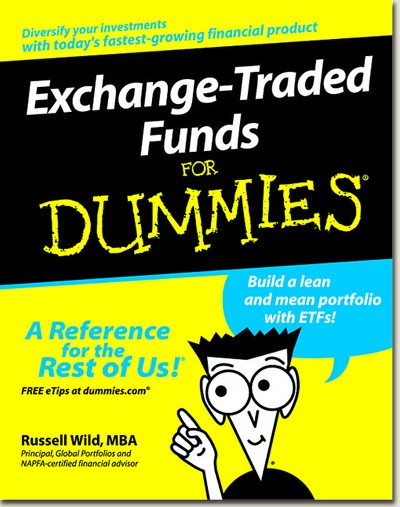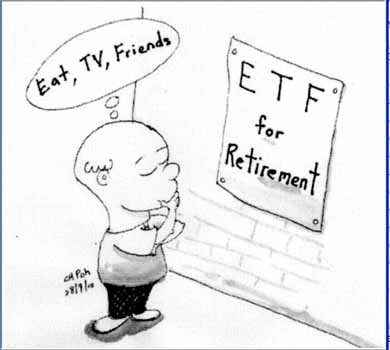What is an ExchangeTraded Fund (ETF)
Post on: 12 Май, 2015 No Comment

Send To A Friend
Although they have been around since the early 1990s, a number of investors and retirement mutual fund participants are asking their brokers about exchange-traded funds, also known as ETFs. These investment vehicles have become popular as a good alternative to mutual funds since they typically have lower management fees, flexibility and the possibility of benchmark returns at a minimal cost.
A Basic Guide to Understanding an Exchange-Traded Fund (ETF)
An exchange-traded fund (ETF) is unique in that it acts like a stock or equity, but values like an index and is organized or managed like a mutual fund. Created in 1993, an ETF is a fund which holds assets such as stocks, commodities, or bonds and trades those positions on stock exchanges during market hours. Most ETFs track an index, such as a stock or bond index for net value over the course of the trading day (unlike mutual funds which are only valued at the end of day price). Some ETFs list derivatives and futures contracts, but they can also be short sold or margined.
How do ETFs Work?
ETFs combine some of the best aspects of various types of investments in one convenient package to provide investors with a benchmark return at minimal cost. As a type of index fund, an ETF’s value follows the market up and down in an attempt to replicate the performance of that segment of the market (e.g. S&P 500, China, coffee, natural gas futures). When you buy shares in a specific ETF, you are buying a piece of a portfolio which follows the yield and return of its index.
They are extremely flexible, similar to stocks, and can be bought or sold throughout the day, yet they can be a great, inexpensive way to diversify a portfolio like mutual funds. The point is to grow by closely mimicking the performance of a growing market not by trying to beat the market as one might by holding onto regular stocks.
In addition, they are an especially good choice for those who favor a “passive” investment approach. You could try to pick individual stocks in an particular industry or you could buy into an ETF that tracks the industrys index. By holding a diverse collection of stocks in the sector you can still reap the rewards you seek while having some protection from volatility and multiple fees.
Types of ETFs
There are many types of exchange-traded funds out there and not all are designed to mimic index funds, so be careful. While the majority of ETFs invest in common stock they can invest in a combination of asset classes.
Common Stocks Equities
When ETFs such as industry or market ETFs tracks an index, they consist of the same stocks as the index itself, just in different portions. As indexes tracking those equities rebalance, the ETFs will rebalance the shares as well in order to prevent a price discrepancy.
Commodities Futures
Many commodity ETFs consist of futures contracts to track the price of a physical commodity like precious metals (gold, silver, etc.), agriculture goods or energy (gas, oil, etc). The ETF may hold the underlying commodity in storage (like a gold bullion) or use the performance of futures contracts to create the desired return.
Some ETFs use derivatives or options to create returns. With options, the ETF does not hold the actual commodity or stock, but holds the option or right to buy that security at a certain price up to a certain date. This is an example of a leveraged investment.
Foreign Currencies
ETFs offer an alternative to traditional methods of investing in foreign currency exchanges. The fund may track a single currency or a basket of various currencies, and just as with commodities, may hold the money in cash or as futures contracts. How the currencies are held and re-balanced will depend on the structure of the actual ETFs.
Bonds and various Debt Securities
Exchange-traded notes (ETNs) and bond ETFs consist of debt securities and bond contracts. These non-interest paying debt instruments are usually backed by a credible financial institution, however ETNs are subject to the solvency of the issuer. These funds can differ widely from US Treasuries to the dollar-based debts of emerging foreign markets.

Advantages for Investors
Just as with mutual funds, ETFs offer the basic advantage of diversification to protect against volatility and reduce risk, however, they offer more to savvy investors and their financial advisors:
- Flexibility and Transparency of a Stock: ETFs trade at a price that is updated throughout the day, as opposed to a mutual fund which prices at the end of the day. In addition, investors are able to see exactly which securities are held by the fund.
- Low Expenses: Actively-managed mutual funds or traditional index trades can incur hefty brokerage and management fees.
- Limited Capital Gains Exposure: Since most ETFS track an index and reinvest their dividends immediately, they experience much lower turnover than mutual funds, thus less frequent tax gain distributions.
- No Minimum Investment Required: ETFs may be bought or sold in one-share increments if desired and usually do not require a minimum investment, unlike mutual funds which may require an initial investment of $1,000 or more.
- Opportunities to Short Sell or Option: Since ETFs are traded throughout the day investor may use futures contracts and options to leverage prices and track their benchmarks.
Drawbacks to ETFs
ETFs are not without their disadvantages. Small and large investors alike should have a clear idea of possible issues they can navigate or avoid altogether.
- Trading Fees: Depending on how you trade an ETF, the trading fees or commissions you pay can add up when you are able to buy or sell positions throughout the day. Most mutual funds have only one chance to trade per day and come with low fee.
- Limited Growth: ETFs may be limited to hold positions in large companies with limited growth opportunities or the fund tracks an index whose overall dividend yield is lower than the return on individual securities (high performing stocks, etc.)
Ask Your Financial Advisor if Exchange Traded Funds Have a Place in Your Investment Portfolio
ETFs are used by many investors in order to build a well-balanced portfolio or gain exposure to specific industries or market sectors. They operate as a mixture of stocks, mutual funds and indices to bring investors solid returns at a low cost. There are disadvantages to watch out for before making an investment. It’s best to speak with a trusted broker or financial advisor to determine how ETFs may or may not bring you investment success.
Be a part of the conversation!
Remember to speak with your financial, legal or tax professional for more information about the topics which interest you. Here are a few ways for you to share your ideas, learn more and interact with FinancialSafetyNet members, authors and expert advisors.














